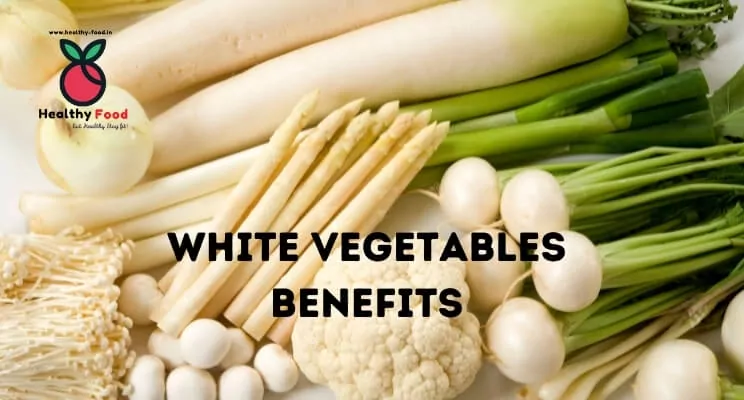Article Contents
White Vegetables
White vegetables such as potatoes, onions, mushrooms, cauliflower, turnips, etc., can help control bad cholesterol in your body. They even have an immune-boosting effect on your body.
Nutrients found in white vegetables minimize the danger of colon, prostate, and carcinoma also.
All vegetables provide health benefits, whether you consume them as food or use them in another form. Vegetables are a healthy diet.
From flavorful cuisines to delicious smoothies and shakes, you should prefer to add vegetables.
Vegetables’ chemical and nutritional properties can improve your digestive system, brain function, bone strength, muscle growth, and blood circulation. You can include these white vegetables in your healthy diet food.
Therefore, you should realize the importance of vegetables in your life.
We are often incorporate bright-colored vegetables in our diet, but white-colored veggies are also very beneficial.
Researchers have concluded that people who eat more white veggies are less likely to get a heart stroke.
But, this does not mean that colorful vegetables aren’t worth eating. It is just that you can rotate white vegetables and colorful ones in your balanced diet.
White vegetables contribute substantial quantities of nutrients that always get omitted. So, rather than eliminating the white foods from your diet, you should include many of them to complete all nutrition in your diet.
Read more to understand the 11 healthiest white vegetables that you should include in your diet more often.
What benefits do the common white vegetables offer? How are they good for you? Let’s try to know.
Why Are White Vegetables Good For You?
A diet consists of colorful foods like vegetables and fruits that offer numerous nutrients and health benefits.
What is more effect of white vegetables and other color foods are often beneficial during a spread of the way.
The advantages could include heart condition prevention, brain function and health, improved bone health, and enhanced muscle growth.
Vegetables are a fast way of meeting our essential nutrient requirements. Nutrition plan food can be beneficial to maintain a healthy lifestyle without the necessity to consume high calories.
Here are the 11 white vegetables that everyone should eat:
11 Healthiest White Vegetables
1. Cauliflower
Cauliflower is found all around the year, but it is in abundance during the winters.
Cauliflowers contain vitamin K, fibers, and an ample amount of vitamin C with 27 calories in a single cup of chopped cauliflower.
Healthy individuals and patients eat cauliflower to suffice their dietary fiber needs.
It is a white vegetable with antioxidant properties that contain vital chemical compounds like indole-3-carbinol that helps to fight cancer.
You can prepare many tasty dishes using cauliflower. You can check lots of online food recipes to choose a favorite recipe as per your taste and convenience.
2. White Mushrooms
White mushrooms contain calories and cholesterol.
Mushrooms are loaded with selenium, potassium, vitamin D, and riboflavin.
White mushrooms can keep your weight in control without compromising the taste and effectively fight infections, colds, and flu.
Aside from preventing infections, white mushrooms even have anti-bacterial, antiviral, and anti-tumor properties.
3. Garlic
It is another white vegetable that is technically an herb that you can feature in your list of white vegetables and incorporate more into your daily diet because the health benefits are so great.
Garlic contains antioxidant properties that keep cold and flu cornered. It also has a lively chemical called allicin that helps to spice up the system.
Since ancient times, people have been using garlic in various medicines and foods. Garlic provides phosphorus, potassium, magnesium, sulfur, chlorine, folate, thiamine, niacin, zinc, calcium, iron, iodine, sulfur, and vitamin C, A, K, and B6.
Raw garlic works excellent in treating colds and coughs. Additionally, garlic may aid in digestion, treating acne, eliminating earaches, and reducing the progression of some sorts of cancer.
You can add garlic in fries, pickles, roasts, and spreads.
4. Onions
The anti-inflammatory chemical in onions, called quercetin, lowers the danger of cancer, prevents arthritis and heart condition. Onions are also very helpful in hair growth treatment.
You can include raw onions in your salad to urge the utmost benefits. Onions contain essential vitamins like vitamin B6, Vitamin C, and Manganese.
Studies suggest the utilization of onions suffice the body requirement of sulfur compounds and aid in cancer prevention.
Onions have antioxidant properties that are most beneficial to the body once you consume them in raw forms, like stir-fried and other food options.
5. Potato
Apart from french-fried potatoes and fried potato peel, potatoes are low in fat and calories. The potato is especially cholesterol-free, which also contains low fat and sodium.
It is an all-purpose vegetable that you simply might already be eating every day in your diet.
They contain quantities of fiber and cause you to feel full after, which makes them suitable for a weight loss diet. Fibers help improve heart health and regulating blood glucose. Potatoes are among the absolute best white vegetables that you should eat more.
6. White Beans
White beans, slightly like other legumes, are often considered to be the sole source of protein.
They provide B vitamins, iron, potassium, and a small amount of calcium. It helps controlling cholesterol.
Like the opposite beans, white beans are a source of protein and the foremost nutritious diet supplement, which also aids in muscle growth.
7. Turnips
A lot of people generally do not like the taste of this white vegetable turnip. But, you will be surprised to understand that turnips are rich in calcium, phosphorous, potassium, sodium, etc.
Further, with many fiber content and low calories, turnips can improve and help regulate your metabolism.
It is no surprise that consuming turnips can also provide sufficient minerals and vitamins and benefit health.
8. Parsnips
Parsnips contain an honest range of vitamins and minerals, including calcium, potassium, magnesium, phosphorus, zinc, iron, folate, thiamin, pantothenate, vitamins B6, C, E, and K, fiber, and antioxidants.
If included in your diet regularly, it will significantly reduce your risk of many diseases and health complications.
Parsnips are rich in properties that can benefit heart health. All of those vitamins and minerals help boost the nerve system and strengthen the bones.
9. Green Cabbage
Green cabbage is not technically white. But it is white after you get through the primary few layers of it. It is a white vegetable from the inner layers.
We eat a lot of cabbage. It tastes fantastic when roasted. But it also works well for sauerkraut!
You will use it in casseroles and soups. I like it in homemade coleslaw. Cabbage is so versatile and will be eaten raw or cooked.
There are quite a few sorts of cabbage, including Napa and Bok Choy. Generally, stick with the green cabbage both for flavor and performance.
Cabbage provides dietary fiber, calcium, magnesium, potassium, Vitamins C, B6, K, E, sulfur, and choline.
It helps to reduce inflammation, cancer prevention, proper digestion, boosting the system, repairing skin, strengthening bones, and improving vision.
10. White Leeks
Leeks are tasty, versatile, and straightforward to rearrange.
White leeks give vitamins A, K, magnesium, riboflavin, vitamin BC, niacin, and thiamine.
They are easily added to soups and salads to bring out a mild flavor. White leeks are vegetables from the onions, garlic, and shallots group of vegetables.
White leeks are loaded with potential nutrients properties that can fight against inflammations.
Moreover, white leeks may help heart health which lowers the danger of heart diseases and strokes.
11. Rutabaga
Rutabaga is another newer vegetable and another one that is quickly becoming a favorite.
Rutabaga is a similar kind of vegetable like cabbage and turnip. It is a lightweight sweet cabbage-like vegetable.
Their firm flesh holds up well in baking, making them an outstanding substitute for potatoes.
Rutabagas provide potassium, phosphorus, magnesium, calcium, iron, zinc, and vitamins C, E, K, and B. They also contain glucosinolates, which scale back tumor growth.
Benefits of Winter White Vegetables
White fruits and vegetables contain nutrients known to lower the extent of bad cholesterol in your body and lower high vital signs.
White vegetable helps to immune-boosting effect on your body.
Nutrients found in white fruits and vegetables minimize the danger of colon, prostate, and carcinoma also.
If you have resolved to eat more vegetables or cut out white foods, this post is often for your knowledge.
For those thinking of eliminating white foods from your diet, you should re-think again, go through the nutritional health benefits of white vegetables to take advantage of adding them to your regular diet.
When people hear the phrase eat a colorful diet, they have a bent to ditch white veggies.
White vegetables such as cauliflower, white potatoes, parsnips, onions, turnips, mushrooms, celery root, and many more can add more health benefits with green vegetables.
Counting on where you reside and thus the availability of winter farmer’s markets, choosing white veggies also can be easy due to eating more locally-grown produce.
While it is true that brightly colored produce boasts compounds that will boost health, an equivalent said of white vegetables.
White potatoes are highly nutritious, providing many potassium, fiber, some vitamin C, and magnesium. Once you eat vegetables, whatever many are the color, you are doing well for your body, adding nutritional benefits.

